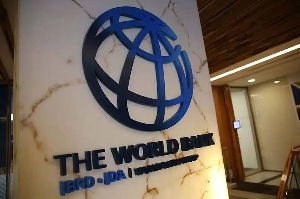A member of pressure group OccupyGhana, Kathleen Addy, has described as “strange” the ability of the Commissioner for the Commission on Human Rights and Administrative Justice (CHRAJ) to always find money to take care of her luxury, but complains of lack of funds when it comes to finding money to do the work that she was appointed to do.
“It’s curious. How is it that you find money for everything, but the work that you do?” Addy wondered on Citi FM’s Saturday current affairs programme ‘The Big Issue’.
“How do you find money for rent, for benefit, for car, for travel, for per diem, you find money for everything else but when it comes to money for work, the work for which you were appointed, the reason for which you are on that seat…then all of a sudden there’s no money. It’s strange,” she said.
The embattled CHRAJ boss, Lauretta Lamptey was recently asked by President Mahama to step aside as investigations are conducted into allegations that she misconducted herself by spending too much money on rent.
The suspension of Ms Lamptey by the President was on the advice of the Judicial Council and pursuant to Article 146 (10) (b) of the 1992 Constitution, following the “establishment of a prima facie case against her by the Chief Justice, and the setting up of a five 5-member committee to investigate complaints made against her,” in separate petitions filed by Nsawam Adoagyiri MP Frank Annor Dompreh and Richard Nyamah, leader of pressure group Progressive Nationalist Forum.
According to a statement signed by Chief of Staff Prosper Bani noted, Lamptey’s suspension is to protect the integrity of the enquiry.
She was asked to hand over her duties to a Deputy Commissioner of CHRAJ, Mr. Richard Quayson, not later than Friday January 16, 2015.
In August last year, Ms Lamptey moved into a hotel after her US$4,200 monthly rent including utility bills, at the AU Village expired after being there for 33 months.
Her official residence, which was previously occupied by former Commissioner Francis Emile Short, was at the time being redesigned with several variations at her instance, all at a cost of GH¢182,000.
Lamptey, as of late last year was paying $456 a day for her hotel accommodation. In total, about GH¢161,302.5 was spent on Lamptey’s stay in the hotel between August and November 2014.
There was a lot of public outrage vented at her by anti-graft bodies including Transparency International’s local Chapter – Ghana Integrity Initiative (GII), as well as other civil society groups and opposition parties.
The controversy led to the removal of CHRAJ from a list of Human Rights Commissions for an International study.
Anti-graft body Ghana Integrity Initiative had earlier asked Ms Lamptey to step aside voluntarily for investigations to be made into the saga.
Short also expressed qualms about Lamptey’s action, which he said erased the Commission’s credibility in fighting corruption.
However, Ms Lamptey, on Friday told Joy FM’s Kojo Yankson in an interview on the Super Morning Show that she was befuddled by the avalanche of flak against her, since a similar action by her direct predecessor Anna Bossman did not attract the least of the attention she has been saddled with currently.
“I was told in my first week in office that the official house was being renovated and that the Commission would have to rent out for me. It wasn’t a decision on my part. It was a policy which CHRAJ had had for several years – and many public institutions and I think that is what the public was not aware of, that because of the shortage of official accommodation for certain positions where the state has that obligation, the institution goes on the open market and rent.
“And CHRAJ had done so for my predecessor [who] had been renting since 2002 and it had never been raised as an abuse of office or any of the other ways in which the commission renting in order to provide official accommodation to a commissioner or a deputy the way in which that’s being described now.
“Suddenly when it’s me, it became: ‘I’m renting.’ But at the time that I went in, the Commission was renting official accommodation for Ms Bossman: in fact the rental was still ongoing because she had resigned ahead of time and it had never been questioned or queried; CHRAJ was trying to do what it is supposed to do as a state institution,” Ms Lamptey said.
CHRAJ has a three-prong constitutional mandate: serves as a human rights institution, Ombudsman and anti-corruption agency.
Human Rights Institution
It has a broad mandate to protect universal human rights and freedoms, especially those vested in the 1992 Constitution, including civil, political, economic, social, and cultural rights. Specific mandates concerned with the protection of human rights can be found in Article 218 (a), (c) and (f) of the 1992 Constitution and Section 7 (1) (a) (c) and (g) of the CHRAJ Act. As the National Human Rights Institution of Ghana, the Commission has a duty to promote and protect fundamental human rights and freedoms in Ghana. The Commission’s human rights functions can be divided into two categories: 1. Promotion and Prevention 2. Protection and Enforcement.
Ombudsman
CHRAJ is mandated to protect and promote administrative justice to ensure that the government and its officers are accountable and transparent.
The Commission ensures that the administrative organs of the State provide equal access to employment and services and that they are administered fairly.
In particular, this function of the Commission is to ensure that public officials avoid arbitrariness or bias in their actions.
The Administrative Justice functions of the Commission replace the office of the Ombudsman, created by the Ombudsman Act of 1970, which investigated administrative decisions to ensure justice. This mandate is contained in Articles 218 (a), (b) of the 1992 Constitution and Section 7 (1) (a), (b) of Act 456.
The Commission is mandated to investigate complaints concerning injustice and unfair treatment of any person by a public officer and to: “investigate complaints concerning the functioning of the Public Services Commission, the administrative organs of the State, the Armed Forces, the Police Service and the Prison Service in so far as the complaints relate to the failure to achieve a balanced structuring of those services or equal access by all to the recruitment of those services or fair administration in relation to those services” – Article 218(b).
Anti-corruption
CHRAJ also serves as an Anti-Corruption Agency. Its anti-corruption powers stem from Articles 218(a) & (e); 284-288 of the 1992 Constitution and Section 7 (1) (a), (e) & (f) of Act 456. The Commission both investigates and works to prevent corruption.
The Commission is mandated to investigate abuse of power and “all instances of alleged or suspected corruption and the misappropriation of public monies by officials” [Article 218 (e)]. The Commission investigates allegations of Conflict of Interest under Chapter 24 of the 1992 Constitution.
General News of Saturday, 17 January 2015
Source: starrfmonline.com













